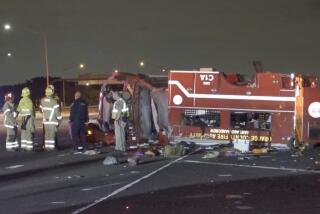Trauma Unit’s Future Unclear
Los Angeles County Supervisor Yvonne Brathwaite Burke said Monday that the county’s health department chief had made a rushed recommendation to close the trauma unit at the troubled Martin Luther King Jr./Drew Medical Center and that the department had given supervisors incomplete information before they backed the closure plan.
The health department chief, Thomas Garthwaite, meantime, provided the most detailed public rationale to date for the proposal to close the trauma unit. And he gained some important, although hedged, support from an influential doctor who said area hospitals could absorb patients currently treated at King/Drew -- at least if they got more money.
King/Drew’s problems, which have included numerous cases of poor care and in some instances have contributed to patient deaths, are too serious to solve without large-scale change, Garthwaite said.
“If we do not take drastic action, King/Drew will be closed,” he said. “We have been told we cannot go on operating the way it is.”
The comments by Burke in an interview and by Garthwaite at a news conference came as county supervisors prepared for a potentially raucous public discussion today on the future of the county-owned hospital.
Last week, supervisors unanimously suggested closing the trauma unit this year. The move drew widespread protest from political figures and from the residents, mostly black and Latino, of the communities served by the hospital, which is in Willowbrook, south of Watts. The areas around King/Drew include neighborhoods with the highest rates of shootings and homicides in the county.
On Friday, Burke, who represents the area, expressed second thoughts about closing the trauma unit and proposed postponing a decision.
In an interview Monday, Burke said the proposal was premature and could cost some patients their lives. She said she had been unhappy all along with the decision -- forged in closed-session meetings earlier this month -- but had agreed “to go along because this is the only way to save the hospital.”
After the decision, she said, reading newspaper reports and hearing protests from medical workers and constituents convinced her that the proposal demanded more study by a team of medical consultants that the county has yet to hire.
The county health department, she said, had failed to give the supervisors important information before the decision on issues such as whether other hospitals could absorb the patients currently treated at King/Drew. The hospital treated roughly 2,100 trauma patients last year and is expected to treat about 1,800 this year, officials said. The decline in numbers came about because of an earlier decision to reduce the geographical area served by King/Drew’s trauma unit.
“I have now found out that California Hospital is going to take a while to get a trauma center going,” Burke said, referring to a hospital in downtown Los Angeles that health officials hope will open a trauma unit.
“I also heard the city paramedics making these statements that there might be a threat to life” because diverting patients to other hospitals would lengthen their ambulance rides. “I just think that there was not the groundwork done.”
“All I’m asking for is a second opinion,” Burke said. “If I was going to have a toe operated on, I’d want a second opinion.”
Burke acknowledged, however, that she does not currently have support on the board for postponing a decision.
Garthwaite, she said, first suggested closing the trauma center during a closed-door discussion with supervisors about reforms that federal regulators have demanded at the beleaguered hospital. She said Garthwaite was “so rushed” to draft a written proposal for the board that not enough time went into thinking through the controversial plan.
In defending his decision Monday, however, Garthwaite insisted that the county has no safe alternative to closing the trauma unit.
“My name is on the line to determine whether care is safe or not,” he said. “My name’s going to say we need to decompress that hospital.”
Health department officials are open to an alternative, he said, but he added: “I don’t know what it could be.”
“We have a dozen very skilled and experienced administrators in the discussion on this,” he said. “No one else can see something obvious.”
Garthwaite stressed that the proposal to close the trauma unit is not designed to save money.
Indeed, rerouting patients to other hospitals would probably raise the county’s costs. Instead, he said, the problem is that trauma centers require a lot of resources other than money. Closing the trauma center at King/Drew could free overworked nurses, doctors and pharmacists to take care of other patients.
“We have to slow down the influx of patients,” he said.
With federal regulators and accreditors scrutinizing King/Drew, the shortage of permanent nursing staff has become particularly glaring, he said. Countywide, the health department has a shortage of about 1,200 nurses. Nearly half of King/Drew’s 312 nurses are “traveling” nurses, who are hired for eight-week stints and are new to the hospital and its myriad problems.
“The inspectors come here and they say, ‘What do you do when this happens? Do you give drugs like this? Do you chart [patient treatments] like this?’ ” Garthwaite said. With so many temporary nurses, he said, the answers are often inconsistent.
He compared the situation to going into Home Depot looking for a gadget, only to have a clueless salesman holler to another worker for help: “Hey Charlie, come here!”
The county has 12 other trauma units, and officials said they are working to make sure ambulance travel times would not be longer if King/Drew left the system.
“The current planning would keep it within the 30 minutes,” said county health spokesman John Wallace. “People think if you add two to three minutes, people are going to die. That’s not what the medical experts are saying.”
Two major components of that plan are persuading California Hospital Medical Center to open a trauma center and sending many patients who would have gone to King/Drew to St. Francis Medical Center, a private hospital nearby in Lynwood.
Dr. Daniel Higgins, the head of the county medical association and an emergency room physician at St. Francis, who had been sharply critical of the King/Drew proposal last week stood with Garthwaite on Monday.
Higgins said he had softened his stance over the weekend when county officials convinced him that they had a plan to deal with the heavy load of patients from King/Drew, many of whom lack insurance.
“It’s not ideal,” he said Monday. “We can take 300 to 500 patients if 1,000 go to California and 500 go to Harbor, and we have funding,” he said, referring to California Hospital Medical Center and Harbor-UCLA Medical Center, which is south of King/Drew.
“Maybe I’m being a Pollyanna about this, but the only way to fix the problem is to work with the county,” Higgins added.
Gail Anderson Jr., the medical director at Harbor-UCLA, also spoke at the news conference and said his hospital could handle more patients but would need additional resources.
Those comments raised a key issue -- money.
St. Francis, as a private hospital, could afford to take King/Drew’s patients only if the county provides a way of paying for them.
Currently, the entire countywide trauma system is staggering under the cost of treating uninsured patients.
“Without permanent funding, the trauma system will collapse by the end of the year,” Higgins said.
As for California Hospital, Carol Meyer, the county’s emergency services chief, said officials there had “indicated they are working towards becoming a trauma center,” but could take up until the day King/Drew’s trauma unit was officially closed to make a final decision.
Also on Monday, the statements by public officials opposing the closure grew in volume and intensity.
At a community forum at King/Drew called by Assemblyman Mervyn Dymally (D-Compton), area residents, activists and other elected officials called for the trauma center to remain open.
The group listened intently as Jeff Flick, a regional administrator for the federal Centers for Medicare and Medicaid Services, which has been inspecting King/Drew, said during a telephone hookup that he had not recommended the trauma center’s closure.
To murmurs of approval from the crowd, Flick said his agency had not found any serious issues in the trauma unit although it had sharply criticized many other aspects of the hospital’s operations and had recommended sanctions.
“It was our suggestion that an outside expert be brought in,” he said.
More to Read
Sign up for Essential California
The most important California stories and recommendations in your inbox every morning.
You may occasionally receive promotional content from the Los Angeles Times.










